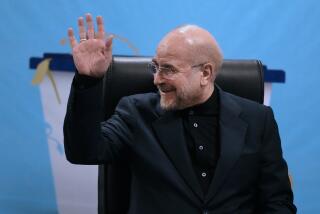Baath-bashing in Iraq
- Share via
Iraq’s upcoming parliamentary elections should be about jobs, public services and government competence. Candidates should be focused on the country’s security and on reconciliation among Shiites, Sunnis and Kurds.
Instead, the national vote once again is turning into a sectarian brawl in which Shiite parties jockeying with one another for dominance are stirring populist fears of a return of Saddam Hussein’s Sunni-led Baath Party. Never mind that Hussein was executed in 2006 or that the discredited Baath Party already is outlawed. The Accountability and Justice Committee, led by Ahmad Chalabi, the Shiite politician and onetime darling of the George W. Bush administration, has been purging candidates who were members of the Baath Party and, in the process, fueling minority Sunnis’ suspicions that the real motive is to further reduce their power.
Undoubtedly some former Baathists were complicit in the crimes of the previous regime and should be banned from running for office. But many others joined the party merely to secure an education or a job and were not involved in running the repressive government. The committee originally blacklisted 535 candidates. Some dropped out or were replaced by their parties; a handful of others subsequently were cleared to run. But about 175 candidates -- no one seems certain of the exact number -- are still banned, including the prominent Sunni leader Saleh Mutlak, who left the Baath Party in the 1970s and is a member of parliament now.
The vetting process smells. Chalabi, remember, was the source of bad “intelligence” on weapons of mass destruction that helped justify the U.S.-led invasion in 2003. He was pro-American while it suited his ambition, but of late has accused the U.S. of meddling and has turned increasingly toward Tehran for support. Now he is screening parliamentary candidates while he is himself running for parliament.
Such a conflict of interest should not be tolerated, but who is going to hold Chalabi accountable or insist on impartiality? Not Prime Minister Nouri Maliki, whose party is competing with Chalabi’s for Shiite votes. Rather than rise above sectarianism as he has in the past, Maliki is also pandering to the Shiite street with an anti-Baathist line. But in fact, many of the banned candidates are notable not for being Sunnis -- some aren’t -- but for coming from secular, cross-community parties that present a challenge to both Chalabi and Maliki’s Shiite coalitions.
U.S. officials have pressed for fairness, but to little effect. Iraq’s ambassador to the United Nations told the Security Council on Tuesday that another committee would review the list of barred candidates. It should do so fairly and quickly to salvage what legitimacy remains of the March 7 vote, and to keep disillusioned Sunnis from abandoning peaceful politics altogether. Then, U.S. and international observers must ensure that everyone can cast ballots and that the count is conducted without fraud.
More to Read
Sign up for Essential California
The most important California stories and recommendations in your inbox every morning.
You may occasionally receive promotional content from the Los Angeles Times.










